Introduction to Law of Contracts | Legal Reasoning for CLAT PDF Download
What is a Contract?
Essentially, a contract is any agreement between two or more parties which is "enforceable by law" and wherein each party promises to do or not to do something in return for another party promising to do or not to do something for the former party.

- Meaning of Enforceable: Here, “enforceable” means having the binding effect of law.
- Example to understand the term Enforceable:
Suppose, a person X enters into a contract with person Y for the sale of his (X’s) car to Y for Rs. 50,000. Now X and Y may choose to record the terms and conditions governing the sale in question on a piece of paper.
This contract is enforceable under law, which means that if Y takes possession of X’s car but refuses to pay Rs. 50,000 to X, as was agreed, X can approach a court of law and seek appropriate relief, such as requiring Y to return the car to X. - Essence of Contract: The essence of entering into a contract is to bind each party to the contract to perform its respective obligation, which is recorded in the contract.
- Oral and Written Contracts: While Indian law also recognizes oral contracts, it is common to record the terms of a contract on paper, which can be used as tangible evidence by any party to the contract in a court of law. If the contract is in written form, it will be easier to prove its execution and accordingly prove the liability of the other parties to fulfill their respective contractual obligations.
- Law governing contracts: In India, the law governing contracts is the Indian Contract Act 1872 (ICA), which is legislation containing detailed provisions on various aspects of contracts, including execution and enforcement. The various provisions contained in the Act are referred to as “Sections”.
Indian Contract Act, 1872
Section 2(h) of Indian Contract Act, 1872 defines contract as “An agreement enforceable by law”. Thus, formation of a contract there must be an agreement, and the agreement should be enforceable by law.
- The Indian Contract Act of 1872 came into force on 1st September 1872. It extended to the whole of India except the state of Jammu & Kashmir. But in 2019, after the removal of Article 370, the special rights given to Jammu and Kashmir completely ended.
- It provides a legal framework for the trade and commercial activities in which contracts are involved and social and familial contracts.
- All agreements are not enforceable by law, and therefore, all agreements are not contracts.
- A contract binds both parties by the words written/agreed by the parties.
Example: An agreement to go to see a movie may be a mere agreement not enforceable by law. Thus, all agreements are not contracts.
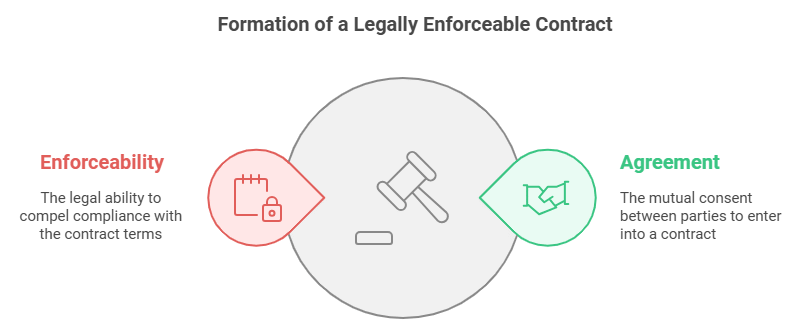
Structure of Indian Contract Act, 1872
The originally executed act had 266 sections. Later in 1932, sections 239 to section 266 relating to partnership, and in the year 1930, sections 76 to section 123 relating to the Sales of Goods Act were repealed.
Proposal/Offer
- Section 2(h) of the Indian Contract Act 1872 defines the term “contract” as an agreement enforceable by law. A proposal/offer and its acceptance is the universally acknowledged process for making a contract, of which the former is the beginning point. Section 2(a) defines a proposal as “when one person signifies to another his willingness to do or abstain from doing anything, with a view of obtaining the assent of that other to such act or abstinence, he is said to make a proposal.”
- When one person expresses his will to another person to do or not to do something, to take his approval is known as an offer.
- An offer must be definite, certain, and complete in all respects. It must be communicated to the party to whom it is made.
- Generally, the offer should be made with the intention of creating a legal relationship.
Promise in the case of social engagements is generally without an intention to create a legal relationship.
Example: A’s willingness to sell his radio set to B for Rs. 500 if B accepts to purchase the same, amounts to a proposal by A for the sale of the radio set.
Essentials of a Valid Offer
- While making a contract, it is essential that the offer should be communicated to the other party. A proposal is complete when it is communicated. (Section 3)
- A valid offer may be made either expressly or impliedly. An offer that is made by conduct is called an “implied offer,” whereas one which is made by words written or spoken, is called an “express offer” (Section 9). The conduct of the part includes not only their acts but also their omissions.
Types of Offer
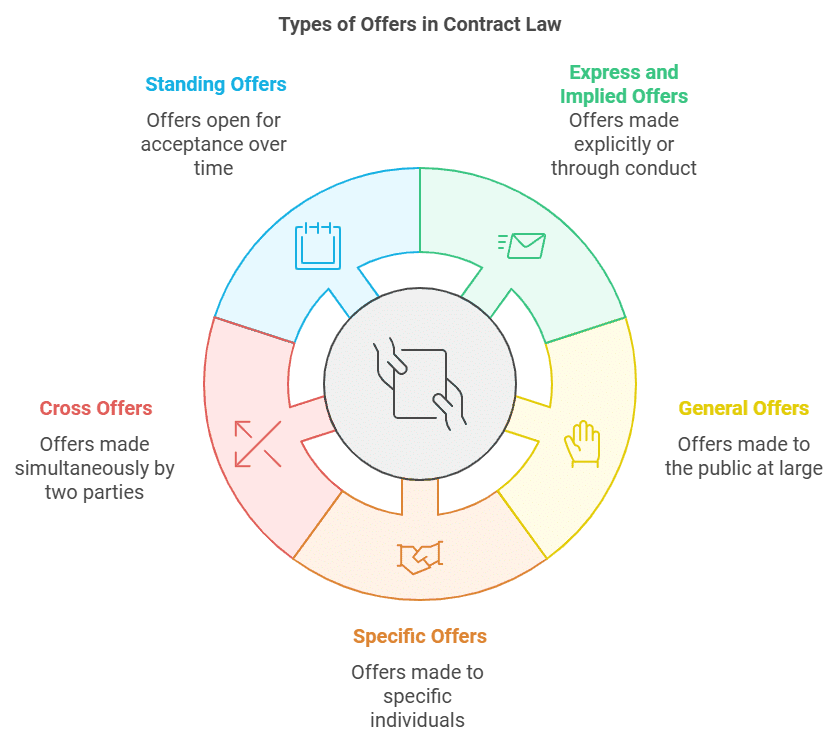 1. Express and Implied Offer
1. Express and Implied Offer
- Most offers are made explicitly or in words (spoken or written). Implied offers are ones that are made through means other than that of an explicit offer.
- Usually, we look at the conduct of the parties to determine an implied offer.
Example: when you board a public bus, it is not because the bus conductor has explicitly asked you the board the bus.
- The offer is implied in the fact that the bus plies on a particular route, and is offering to transport people for a fare. If you board the bus, then you impliedly accept to pay the fare.
- Even returning the dog or providing any information, in the case of a general offer, is a way of impliedly accepting the offer of reward.
Example: A person who boards a bus or who hires a taxi, undertakes to pay the fare at his destination, even though he makes no express promise to do so.
2. General Offer
- When the same is not made to any particular person but to the public at large, it is known as a general offer.
- A general offer is one that is made to the public at large.
- Anyone who acts upon the offer, or performs what has been set out in the offer (the conditions), after seeing the offer, will be said to have accepted the offer.
- If they successfully fulfill the conditions of the reward (the offer), they can claim the reward.
Example: If Paris loses her Chihuahua, and she puts up an Rs. 1,000 reward in return for any information (the consideration) leading to discovery, then anyone who sees that offer is free to act upon it.
3. Specific Offer
A specific offer is one that is made to a specific person or a specific set of persons. It is the most common type of offer.
Example: When you offer a certain shopkeeper an amount of money in exchange for his goods, no other shopkeeper can accept your offer.
4. Cross Offer
- When the offers made by two persons to each other contain similar terms of bargaining cross each other in the post, they are known as cross offers.
- In these cross offers, even though both the parties intended the same bargain, there would arise no contract.
Example: A offered to sell his watch to B for Rs.2000 through a letter sent by post. On the same date B also wrote to A making an offer to purchase A’s watch for Rs. 2000. When A or B sent their letters, they did not know about the offer which was being made by the other side. A contract could arise only if either A or B after having the knowledge of the offer, had accepted the same.
5. Standing, Open, OR Continuing Offer
An offer that is allowed to remain open for acceptance over a period of time is known as a standing, open, or continuing offer.
Example: An offer to supply 1000 bags of wheat from 1st January to 31st December, in accordance with the orders which may be placed from time to time is a standing offer. As and when the orders are placed that amounts to acceptance of the offer to that extent. In the above-stated illustration, if an order for the supply of 100 bags of wheat is placed on 15th January, there is acceptance of the offer to that extent. So far as the remaining quantity is concerned, this offer can be revoked just like any other offer.
Communication of Offer
The communication of a proposal is complete when it comes to the knowledge of the person to whom it is made. Hence, the offer cannot be accepted unless and until it has been brought to the knowledge of the person to whom it is made.
Example: Mr. X makes an offer that whoever finds his lost dog, will get Rs, 10,000 from him; through a newspaper advertisement. If Mr. Y reads the advertisement and finds his lost dog, he is entitled to get the said amount. But suppose Mr. Y did not read the advertisement, he found the dog moving astray on the road and submitted it to the police. Or suppose, Mr. Y happens to be the neighbor of Mr. X and he finds the dog during his morning walk and takes it to the owner, he will not be entitled to the reward amount.
Promise
- When the person to whom the proposal is made signifies his assent thereto, the proposal is said to be accepted.
- A proposal, when accepted, becomes a promise.
- The person making the proposal is called the Promiser and the person accepting the proposal is called the Promisee.
Acceptance
Acceptance means when the person to whom the offer was made, has given his assent to such offer– Section 2(b) of Contract Act.
- When the person to whom the proposal is made signifies his assent, the proposal is said to have been accepted.
- A proposal, when accepted, becomes a promise. It is only after the acceptance of the proposal that a contract between the two parties can arise.
- Effect Of Acceptance: A contract comes into effect only after the offer is accepted. Before its acceptance, neither party is bound by it.
Essentials of A Valid Acceptance
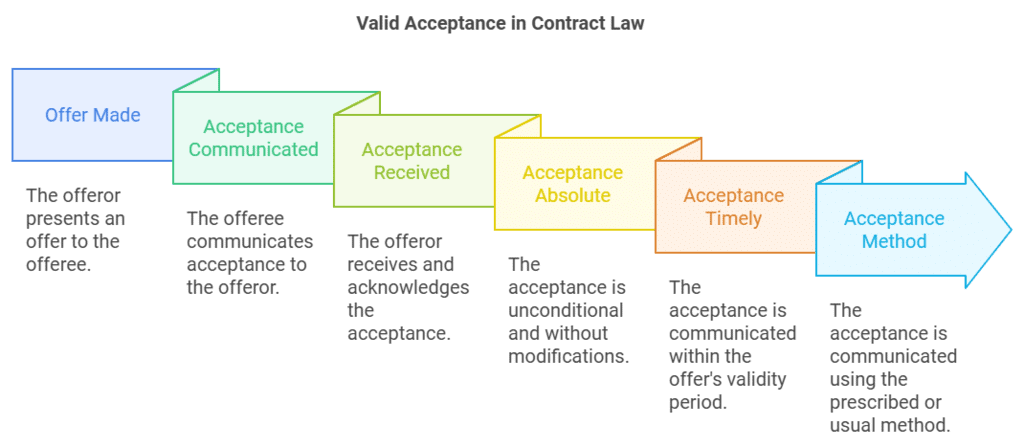 1. Acceptance must be communicated by the Offeror to the Offeree
1. Acceptance must be communicated by the Offeror to the Offeree
- Acceptance, in essence, means making one’s assent known to the offeror i.e. Acceptance must reach the offeror, and he must also be aware of it.
- Offeror makes offer → Offeree gives acceptance → Offeror receives the acceptance = Binding Agreement.
- If Arvind makes an offer to Varun, and Varun wants to accept it, he must ensure that Arvind is made aware of his assent in one way or another.
- What if Varun assigns Rahul, a third party (another person outside the two parties of the contract), to communicate his acceptance to Arvind? What if that third party fails to do so?
Legally, we’ll say Varun’s communication has the effect of being made to a third party and not to the offeror. Therefore, it fails the first rule. As such, the acceptance has not reached Arvind, so he will not be liable to fulfill his offer to Varun. Between Varun and the third party, it’s a different matter. - There, the third party’s liability will depend on the intention with which they had entered into the contract. Try to recall the portion about the legal intention behind an offer from the previous article. Such an acceptance will not form an agreement.
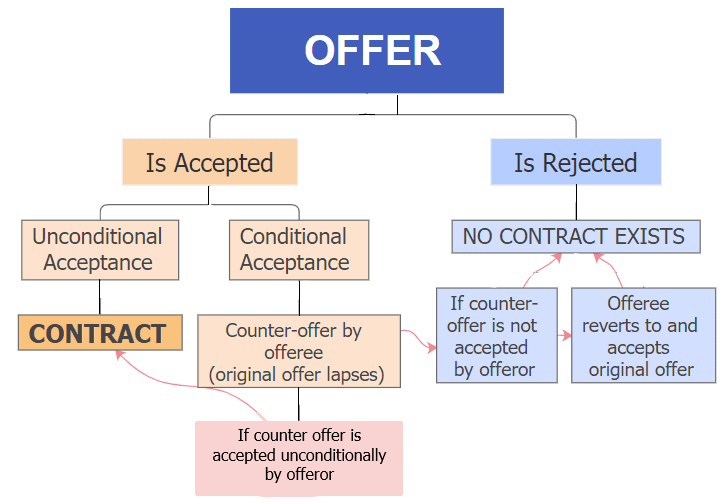
2. Acceptance must be absolute and unqualified
- The Law of Contracts follows a ‘no strings attached’ policy vis-à-vis acceptance. An acceptance cannot have any conditions attached to it. This is because acceptance is one’s assent to an offer as it is.
- This ‘conditional acceptance’ occurs commonly in bargaining.
Words and phrases such as “but”, “if”, and “in case” are key to spotting an acceptance with a condition attached.
If X offers to pay Rs. 100 to Y for a product (legally termed as ‘goods’), Y can either:
(i) Accept the Rs. 100 for the goods.
(ii) Name a different price, let’s say, by saying, “I agree to sell it to you but only at Rs. 120.”In case (i) forms an agreement straight away.
In case (ii), the italicized part of Y’s ‘acceptance’ is his condition. Since he is not agreeing to sell it as per X’s offer, but he agrees to sell it only at his own price.
In such a case, Y is making a counter-offer, which X is free to accept or reject (or even make his own counter-offer!). This counter-offer functions just like any other offer and is not an acceptance of X’s original offer. This will not bind X.
3. Acceptance must be communicated in the prescribed manner or in a reasonable/usual manner
- An offer may specifically mention that the acceptance is sent only by telegram and no other means. If any other means is used, even though the acceptance will be communicated, it will not be a ‘valid’ acceptance for failing this third rule.
- On the other hand, if an offer contains no such stipulation, then any usual mode of communication, such as telephone, e-mail, telegram, fax, etc., may be used.
Example: If a company makes an advertisement for the sale of its products, a buyer should contact the agent by phone or e-mail, instead of floating a large banner in front of the office expressing his intention to buy the products.
4. Acceptance has to be communicated while the offer is subsisting
- If a date is mentioned as the deadline for communicating acceptance, that also makes up the ‘terms and conditions of the offer. Failing that deadline not only bypasses a condition of the offer but also causes the offer to lapse or expire, i.e., no longer exist.
- An offer may be revoked before an acceptance is communicated. This has the same effect, and the offer ceases to subsist.
- Also, once an offer has been rejected or a counteroffer is made to the original offer, the original offer lapses. If the offeree decides to accept the original offer after that, the acceptance will be hit by this rule.
When is Acceptance Completed?
- In case the parties to the contract are present at the same place, one making the offer and the other communicating the acceptance, both parties become bound immediately.

- The law has laid down the following rules when the communication of acceptance is made by post/telegram:
(i) The communication of acceptance is complete as against the proposer when it is put in the course of transmission to him so as to be out of the power of the acceptor.
(ii) The communication of acceptance is complete as against the acceptor when it comes to the knowledge of the proposer.
Example: B accepts A’s proposal by a letter sent by post.
The communication of the acceptance is complete:
(i) As against A, when the letter is posted.
(ii) As against B, when the letter is received by A.
Revocation of Offer & Acceptance
A proposal may be revoked at any time before the communication of acceptance is complete as against the proposer but not after the acceptance.
Modes of Revocation of Offer:
(i) By communication of notice of revocation by the proposer.
(ii) By lapse of time.
(iii) By failure of the acceptor to fulfill a condition precedent.
(iv) By death/insanity of the proposal.
Consideration
- ‘Consideration’ means “something in return”, i.e., quid pro quo, which is an essential element to find out the genuine intention of the parties of the promise to create a legal relationship.
- An agreement without consideration is void and thus not enforceable by law except under certain circumstances.
- Consideration is defined as when at the desire of the promisor, the promise has done or abstained from doing or does promises to do or abstain from something. Such an act or abstinence or promise is called a consideration for the promise.
- An agreement must be supported by a lawful consideration on both sides.
Types of Consideration
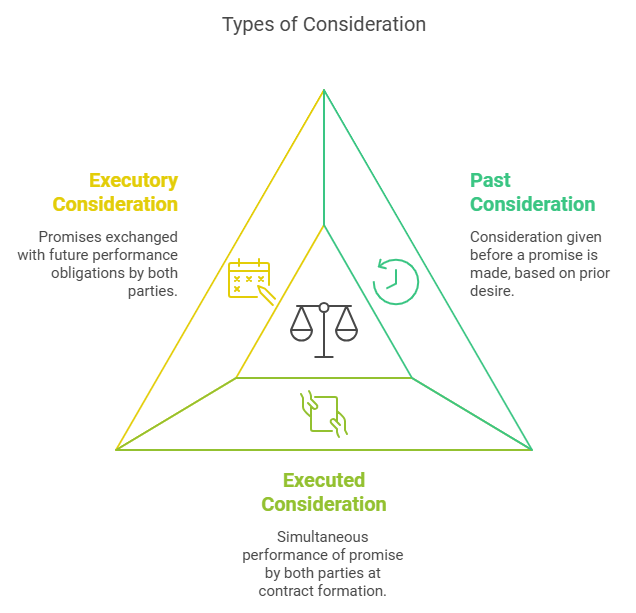 1. Past Consideration
1. Past Consideration
It means that the consideration for any promise was given earlier, and the promise is made thereafter.
Example: I request you to find my lost dog. After you have done the same if I promise to pay you Rs.100 for that, it is a case of past consideration under this the act recognizes only such consideration which has been given at the desire of the promisor, rather than voluntarily.
2. Executed or Present Consideration
- When one of the parties to the contract has performed his part of the promise, which constitutes the consideration for the promise by the other side.
- In other words, consideration is provided simultaneously along with the making of the contract.
3. Executory or Future Consideration
When one person makes a promise in exchange for the promise by the other side, the performance of the obligation by each side to be made subrequest to the making of the contract, the consideration is known as Executory.
Example: A agrees to supply certain goods to B and B agrees to pay for them on a future date; this is a case of executory consideration.
Essentials of Consideration
- Consideration is to be given to the desire of the promisor.
- Consideration to be given by the promise or any other person.
- There should be some act, abstinence, or promise by the promiser which constitutes consideration for the promise.
- Consideration may be past, present, or future.
Agreement
Every promise and every set of promises forming the consideration for each other is an agreement.
An agreement arises by an “offer or proposal” by one of the parties and the “acceptance” of such offer by the other. In another sense, in an agreement, there is a promise from both sides.
Example: A promises to deliver his watch to B and in return B promises to pay a sum of Rs.200 to A. There is said to be an agreement between A & B.
- Offer + Consideration → Agreement
Void Agreements
- An agreement not enforceable by law is said to be void. These agreements include an agreement without consideration, an agreement in restraint of trade, etc.
- There are some agreements that have been specifically or expressly declared as void by the Indian Contract Act. These are as follows:
- Agreements of which the consideration or object is unlawful.
- Agreement without consideration.
- Agreement in restraint of marriage.
- Agreement in restraint of trade.
- Agreement in restraint of legal proceedings.
- Agreements that are uncertain and ambiguous.
- Agreement by way of wager.
- Agreements to do impossible acts.
Principle 2: Acceptance of an offer is essential for the existence of an agreement.
Facts: "Rashid has lost his wallet inside his college campus. He uploads a post on the college Facebook group with its photo and promises a reward of Rs. 500/- for returning it or any information leading to discovery. In the meantime, Aditya, Rashid’s roommate, who was attending a lecture when Rashid discovered he lost his wallet, spots the wallet outside the library. He returns the wallet to Rashid. Later in the evening, when he accesses Facebook, he sees the post with the promise of reward. He approaches Rashid to claim the reward".
Essentials of a Valid Contract
 1. Offer and Acceptance: There must be a ‘lawful offer’ and a ‘lawful acceptance’. In other words, there are some legal rules governing offer and acceptance.
1. Offer and Acceptance: There must be a ‘lawful offer’ and a ‘lawful acceptance’. In other words, there are some legal rules governing offer and acceptance.
2. Intention to Create Legal Obligation: Both parties to a contract must contemplate legal consequences.
Example: a husband offering to take his wife out for a movie is not an agreement intended to create legal relations.
3. Lawful Consideration:
- Consideration is the price paid for the promise of the other. Consideration may be an act/abstinence or a promise.
- It may be past, present, or future.
4. Lawful Object: The Act lays down that the object means purpose, for which the agreement has been entered into must not be fraudulent/illegal/immoral or opposed to public policy.
What considerations and objects are lawful, and what are not - The consideration or object of an agreement is lawful unless
- It is forbidden by law.
- It is of such a nature that, if permitted, it would defeat the provisions of any law or is fraudulent.
- Involves or implies injury to the person or property of another.
- The court regards it as immoral or opposed to public policy.
In each of these cases, the consideration or object of an agreement is said to be unlawful. Every agreement of which the object or consideration is unlawful is void.
Examples:
- A promises to pay B 1000 rupees at the end of six months, if C who owes that sum to B, fails to pay it. B promises to grant time to C accordingly. Here the promise of each party is the consideration for the promise of the other party and they are lawful considerations.
- A, B and C enter into an agreement for the division among them of gains acquired or to be acquired by them by fraud. The agreement is void, as its object is unlawful.
5. Writing and Registration
- It must be clearly understood that contracts do not necessarily need to be in writing. It may be oral or implied.
- However, the Indian Contract Act lays down that in certain special cases, for a contract to be valid, it must only be in writing. Besides, it also needs to be registered.
Example: An agreement for the sale of immovable property must be in writing and registered.
6. Certainty: To ensure that a contract is valid, its terms must be certain. In other words, “agreements, the meaning of which is not certain or capable of being made certain, are void”.
Example: Mr. Sharma agrees to sell his car to Mr. Mukesh at “best competitive price” since the price is not clearly ascertainable in this case, the agreement is void.
7. Possibility of Performance: The Contract Act lays down that “Agreement to do an impossible act is void”.
Example: Nagabushan agrees to bring a dead body alive in return for a crore of rupees. The agreement is not enforceable.
8. Not Expressly Declared Void: The Contract Act has ‘expressly declared’ certain agreements to be void.
The following are the cases:
- Agreement in restraint of marriage
- Agreement in restraint of trade
- Agreement in absolute restraint of legal proceedings.
Thus, an agreement should not be expressly declared void by the Act.
9. Capacity of Parties: The parties to an agreement, must be competent to contract, i.e. the parties must be major, mentally sound, and not be disqualified from contracting by law.
Who is Incompetent to Contract?
- A minor is a person below the age of 18.
- A person of unsound mind or insane.
- A person disqualified by any law to contract.
- Exceptions:
(i) Natural love and affection.
(ii) Compensation for past voluntary services.
(iii) Promise to pay time-barred debt.
In a very popular case, Mohiri Bibee in Dharmodas Ghose (ILR 1903) 30 cal 539, a minor mortgaged his house in favour of a money lender and received certain amount from him. The privy council held that the money lender is not entitled to get the money back which was advanced to a minor. This is because only a person capable of entering into a agreement can make a contract.
Minor and Rule of Estoppel
- Further, a situation may arise where a minor has declared or intentionally caused or permitted another person to believe him to be a person who has attained the age of majority upon such belief. If the moneylender advances some money to the minor, can the minor be held liable to pay?
- The Mohori Bibee case clearly ruled out that the rule of estoppels does not apply against a minor. It means a minor cannot be held liable to repay a loan even if he has procured it by misrepresenting him as a major person.
Minor and Rule of Restitution
- Again, a question arises as to the rule of restitution applying against a minor. Restitution means to restore or return the benefit received by a minor under an agreement.
- A minor is not liable to restore the benefits received under a void contract except in certain cases.
- A minor who has obtained money or goods by misrepresenting him to be a major can be compelled to restore the benefit to the extent he or his estate has benefited. If some benefit of a permanent nature has been accrued to him, he has to restore it.
Examples:
(i) A minor has to restore a car or a house purchased from a loan amount. But he cannot be forced to repay any money used by him for temporary employment, e.g. on eating, drinking, movies etc.
(ii) A minor’s liability for necessaries supplied to him for his living, e.g. food cloth, lodging, medicine and health care etc. under an agreement can be enforced against his property.
(iii) a minor meets an accident and a person expends money on his hospital expenses, he would be reimbursed from minor’s property.
(iv) A minor’s parents are out of the station. His neighbour lends him money to buy food and clothes for himself their claim of repayment would lie against minor’s property.
Facts: A man entered into an agreement with a girl of seventeen years of age.
What is a Sound Mind for the Purposes of Contracting?
A person is said to be of sound mind for the purpose of making a contract if, at the time when he makes it, he is capable of understanding it and of forming a rational judgment as to its effect upon his interests.
(i) A person who is usually of an unsound mind may occasionally make a contract when he is of a sound mind.
(ii) A person who is usually of sound mind but occasionally of unsound mind may not make a contract when he is of unsound mind.
Examples:
(i) A patient in a lunatic asylum, who is at intervals, of sound mind may contract during intervals.
(ii) A person, who is delirious from fever or who is so drunk that he cannot understand the terms of a contract or form a rational judgments as to its effect on his interests cannot contract whilst such delirium or drunkenness lasts.
10. Free Consent
Both parties to a contract must enter it out of their free will and consent. Consent is said to be “free” when it is not affected by reasons such as Coercion, Under the Influence, Fraud, Misrepresentation, or Mistake.
a. Coercion
 Coercion is the committing or threatening to commit any act forbidden by the Indian Penal code or the unlawful detaining or threatening to detain any property, to the prejudice of any person whatever, with the intention of causing any person to enter into an agreement.
Coercion is the committing or threatening to commit any act forbidden by the Indian Penal code or the unlawful detaining or threatening to detain any property, to the prejudice of any person whatever, with the intention of causing any person to enter into an agreement.
Example: A threatens to shoot B is B does not agree to sell his property to A at a stated price. B’s consent, in this case has been obtained by coercion.
Facts: A threatens to kill B by shooting him with a gun if B does not sell his land to A for Rs. 10,000. Pursuant to A’s threat, B agrees to sell his land to A. Choose the correct option.
b. Under Influence
- Under the influence takes place where two persons stand in such a relation that one party is in a position to dominate the will of the other.
- When such a person uses his position to obtain an unfair advantage over the other, any agreement entered into is vitiated by influence a person can be said to dominate the will of others or able to exercise influence over the other if:
(i) He has real or apparent authority over the other, or he stands in a fiduciary relationship with him.
(ii) He makes a contract with a person whose mental capacity is temporarily or permanently affected due to old age, illness, or mental or bodily distress.
Example: Mr A is heavily indebted to Mr. B the moneylender of the village. B gets on agreement signed by A in which he sells all his land to B at a price much below, say one-fourth of the existing market price of the land. Can A challenge the agreement on the ground of being induced by under influence? The answer is yes. It lies upon B to prove that the contract was not induced by influence.
Facts: A obtains the consent of B to enter into an agreement by putting a gun on the head of B‘s girl friend.
c. Fraud
Fraud means and includes any of the following acts committed by a party to a contract, or with his connivance, or by his to enter into the contract:
(i) The suggestion, as a fact, of that which is not true, by one who does not believe it to be true.
(ii) The active concealment of a fact by one having knowledge or belief of the fact.
(iii) A promise made without any intention of performing it.
(iv) Any other act failed to deceive.
(v) Any such act or omission as the law specially declares to be fraudulent. Mere silence as to facts likely to affect the willingness of a person to enter into a contract is not fraud;
Except in two cases where:
(a) There is a duty to speak.
(b) Silence is equivalent to speech.
Example: B says to A – if you do not deny it, I shall assume that the horse is sound”. A says nothing mere A’s silence is equivalent to speech and if the horse is found unsound, he would be guilty of fraud.
d. Misrepresentation
- Misrepresentation means misstatements or unwarranted statements that are not true, though the person believes it to be true. The statement believes it to be true.
- Meanwhile, ‘fraud’ is also called a wilful misrepresentation, where one makes the statement known and believes it not to be true.
e. Mistake
Mistake as to the matter of fact:
(i) Where both the parties to an agreement are under a mistake as to a matter of that is essential to the agreement, the agreement is void.
Example: A agrees to buy from B a certain horse. It turns out that the horse was dead at the time of the bargain, though neither party was aware of the fact. The agreement is void.
(ii) A contract is not voidable merely because it was caused by one of the parties to it being under a mistake, as a matter of fact. In other words, if any one party is under a mistake as to a matter of fact, then that would be considered a valid contract.
Effect of Mistakes as to Law
A contract is not voidable because it was caused by a mistake as to any law in force in (India), but a mistake as to a law not in force in (India) has the same effect as a mistake of fact.
Example: A and B make a contract grounded on the erroneous belief that a particular debt is barred by the Indian law of limitation, the contract is not voidable.
EduRev Tip:
- A valid contract is enforceable by both parties
- A valid contract gives rise to rights and duties.
Voidability
In contracts, voidable is a term typically used with respect to a contract that is valid and binding unless avoided or declared void by a party to the contract who is legitimately exercising power to avoid the contractual obligations.
Voidable Contracts
An agreement that is enforceable by law at the option of one or more of the parties thereto but not at the option of the other is a voidable contract. Thus, a voidable contract is one that could be avoided by one of the parties to the contract at his option.
Example: When the consent of a party to a contract has been obtained by coercion, under influence, fraud or misrepresentation the contract is voidable at the option of the party whose consent has been so obtained.
Facts of the Problem : Lalit with an intention to deceive Rahul into buying his cement factory, falsely stated that his factory is capable of producing 2,000 kg of cement per day. However, in reality, the factory only has a production capacity of 500 kg/ day. Rahul gets induced and agrees to buy the factory. Is it a valid contract?
Some Important Points
- When consent to an agreement is caused by coercion, fraud, or misrepresentation, the Agreement is voidable at the option of the party whose consent was so caused.
- If any part of a single consideration for one or more objects or any part of any one of several considerations for a single object is unlawful, the agreement is void.
- Agreement without consideration, void, unless is in writing and registered or is a promise to compensate for something done or is a promise to pay a debt barred by limitation law.
- Every agreement in restraint of the marriage of any person other than a minor is void. Every agreement by which anyone is restrained from exercising a lawful profession, trade, or business of any kind is, to that extent, void.
- Agreements, the meaning of which is not certain or capable of being made certain, are void.
- Agreements by way of wager are void, and no suit shall be brought for recovering anything alleged to be won on any wager or entrusted to any person to abide by the result of any game or other uncertain event on which any wager is made.
|
63 videos|175 docs|37 tests
|
FAQs on Introduction to Law of Contracts - Legal Reasoning for CLAT
| 1. What is the Indian Contract Act, 1872? |  |
| 2. What is a proposal or offer in the context of a contract? |  |
| 3. What are the types of offers that can be made in a contract? |  |
| 4. What are the essentials of a valid acceptance in a contract? |  |
| 5. How can an offer or acceptance be revoked in a contract? |  |

















